Rachel Neumeier's Blog, page 172
April 21, 2020
Done, at least for now
Okay, at least for the moment, I’m going with this description:
Raised a warrior in the harsh winter country, Ryo inGara has always been willing to die for his family and his tribe. When war erupts against the summer country, the prospect of death in battle seems imminent. But when his warleader leaves Ryo as a sacrifice — a tuyo — to die at the hands of their enemies, he faces a fate he never imagined.
Ryo’s captor, a lord of the summer country, may be an enemy . . . but far worse enemies are moving, with the current war nothing but the opening moves in a hidden game Ryo barely glimpses, a game in which all his people may be merely pawns. Suddenly Ryo finds all his convictions overturned and his loyalties uncertain. Should he support the man who holds him prisoner, the only man who may be able to defeat their greater enemy? And even if he does, can he persuade his people to do the same?
Please Feel Free to Share:








April 20, 2020
Tuyo
First, you all have persuaded me that this is a perfectly okay title. Thank you all! Second, let me make another try at back cover copy.
Here’s the original attempt:
Ryo inGara has always been willing to fight and die for his family and his people. Now that trouble has engulfed the borderlands between the winter lands and the summer country, he thought that death might come to him soon. But he expected to die in battle, not fall into the hands of a powerful enemy warleader. Now he faces more complicated choices, and the fate of both countries may depend on his decisions…
I didn’t like anything much about this and just wrote it so I could have something to enter in the “description” box for KDP so I could get to the part where I uploaded the manuscript and looked at the page count.
Sometimes I think I more or less do a pretty decent job with back cover description, even, or especially, when I just dash it off without thinking too much about it. But as I said, I didn’t think much of this attempt, and your comments certainly reinforced that opinion.
So, let me try again.
The basic idea when you’re writing back cover copy is to stuff your book into this format:
When OPENING CONFLICT happens to CHARACTER(s), they have OVERCOME CONFLICT to COMPLETE QUEST.
I got that years ago from Nathan Bransford and I do think it’s a good basic model for how to write cover copy. Then you add whatever you think is catchy for about seven lines and you’re done. Again I agree with Nathan there: there’s no point to long, drawn out description that goes on and on. That’s just going to turn off a reader, imo.
Worse still if the back cover reveals plot points that ought to come as surprises to the reader, or even shocking reveals. A startling number of book descriptions do that; I don’t know why and wish they would stop. In TUYO, there is a reveal, and definitely one I’m trying to hide, though an astute reader with a suspicious mind might pick it up earlier than someone who’s zipping fast through the story without thinking too much about what might be coming up.
So let me try again, taking all your helpful comments into account:
——
Raised a warrior by a warrior people, Ryo inGara has always been willing to die for his family, and for the people of the winter lands. Now that war has erupted between his people and the summer country, the prospect of death in battle seemed imminent. But when his warleader leaves Ryo to die at the hands of their enemies, he faces a fate he never imagined.
Ryo’s captor, a lord of the summer country, may be an enemy . . . but far worse enemies are moving, with the current war nothing but the opening moves in a hidden game Ryo barely glimpses, a game in which all his people may be merely pawns. Should Ryo give his loyalty to the man who holds him prisoner, the only man who may be able to defeat their greater enemy? And even if he does, can he persuade his people to do the same?
——
A little longer than I might like, and, eh, there are some things here I don’t much care for. But I do think this is a much better job than my first try. What do you all think?
Please Feel Free to Share:








April 17, 2020
Back cover copy is hard
Back cover copy is difficult to write well, as everyone, probably, agrees. So why should I try to manage it all by myself, right? What do you all think of this:
——–
Ryo inGara has always been willing to fight and die for his family and his people. Now that trouble has engulfed the borderlands between the winter lands and the summer country, he thought that death might come to him soon. But he expected to die in battle, not fall into the hands of a powerful enemy warleader. Now he faces more complicated choices, and the fate of both countries may depend on his decisions.
————
What do you think?
Please Feel Free to Share:








On Grief, Joy, and Saying Goodbye: Reepicheep and Aslan’s Country
Here’s a great column at Matt Mikalatos at tor.com: On Grief, Joy, and Saying Goodbye: Reepicheep and Aslan’s Country
In the end, Reepicheep dies.
That’s something I didn’t understand when I read Voyage of the Dawn Treader as a kid. Lewis wouldn’t—indeed, didn’t—say it that way. In fact, he says the opposite, right in the text of the novel: While no one can claim to have seen Reepicheep from the moment he crested the great wave at the end of the world, Lewis says, “my belief is that he came safe to Aslan’s country and is alive there to this day.”
This is a profound column. You don’t really want to read an excerpt. Click through and read the whole thing.
Please Feel Free to Share:








April 14, 2020
20 feel-good SF novels
From Book Riot, 20 Feel-Good SF Novels
Good topic! Let’s see what we have here. The post starts:
You may long for a trip to a far-off corner of the galaxy or a romp through time and space. And you may want it without a lot of high-stakes intergalactic warfare or earthbound dystopias. You’re in luck. These 20 feel-good science fiction books will suit different tastes and moods, but they’re all comfort food of some variety.
Very promising! Low stakes is a good thing, sometimes. Let me see if I’ve read any of their choices …
Yep! Here’s Becky Chambers, no surprise because I do think this is a feel-good novel in a lot of ways. However, this post picks the first one: Long Way to a Small Angry Planet.
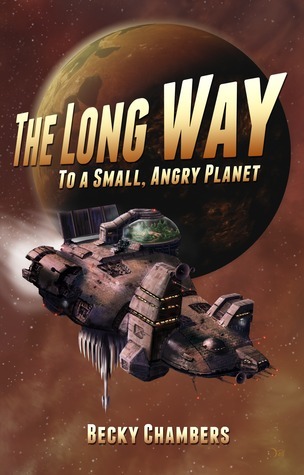
I’m not sure the stakes are that low! True, we’re not saving the galaxy, but the personal stakes are quite high in several ways. That can create more tension not less, than imminent destruction of the galaxy. It doesn’t always, but it can. But I would still approve this choice. It just feels right a feel-good list.
I haven’t yet read the third book in this series, but from what I’ve heard, it might be a better choice for “low stakes.” How about it? I know some of you have read it. Is it a low-stakes novel and/or a feel-good comfort read?
Oh, interesting choice! All Systems Red by Martha Wells.
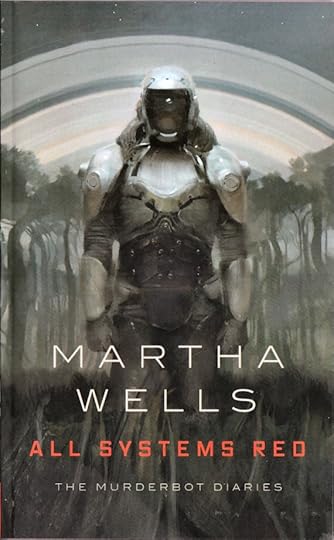
I agree, but largely because I’ve read it a bunch of times. Wow, this is a pretty dystopian backdrop considering the Book Riot post specifically says for when you don’t necessarily want a dystopia.
As a side note, the Murderbot novella is going to be released in just a few weeks — May 5th, I think. I’ve pre-ordered it. I sure don’t pre-order many ebooks with this high a price, I will add. I’ll pay that much for an ebook for about three authors most of the time, and for various other authors if I happen to really want to read that particular new title of theirs right then.
What else do we have on this Book Riot post … Okay, here’s another:
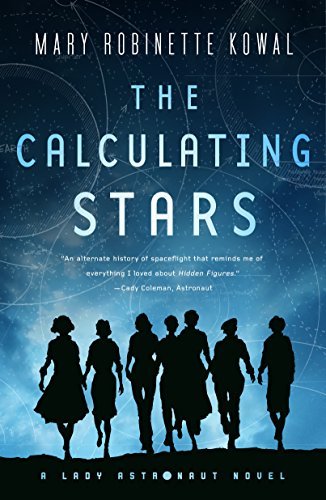
Gosh, does that seem low stakes? Really? I mean:
On a cold spring night in 1952, a huge meteorite fell to earth and obliterated much of the east coast of the United States, including Washington D.C. The ensuing climate cataclysm will soon render the earth inhospitable for humanity, as the last such meteorite did for the dinosaurs.
In what particular respect is that low-stakes?
Well, fine, I don’t know that I agree with these choices exactly, but I did like all three of their picks that I’ve read. I do have a couple choices of my own that I think totally belong on such a list:
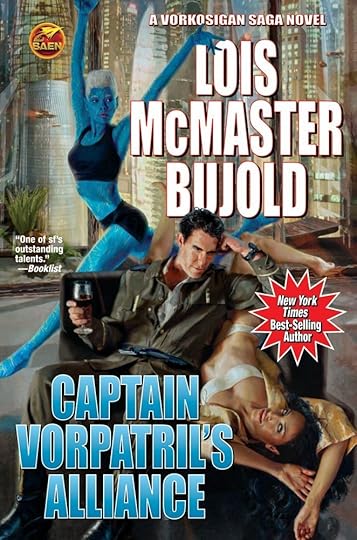
Will Ivan sort out his personal life? Will he remain married to the beautiful wife he married as an emergency measure to protect her from her enemies? Take a wild guess! And the very worst that can happen is that he winds up not married to Tej at the end, not that that’s remotely likely. But talk about low stakes! THIS is the perfect SF comfort read, in my opinion.
Here’s another SF novel that is definitely lower stakes and comfortable. It’s the first book of a series:

We follow a young man as he makes a pleasant life for himself on a merchant ship. Later he sorts out various problems on a variety of other ships, as he advances to captain himself.
The stakes are almost infinitesimal. Also, the main character is perhaps a trifle unbelievably competent with social relationships. However, I did like the series quite a bit, some installments more than others.
What else is out there? If you’ve got a feel-good science fiction novel in mind, drop it in the comments.
Please Feel Free to Share:








April 13, 2020
Finished, for sure this time
So, I think this year’s extraordinary weirdness means that NY publishers are probably pretty distracted.
Also, for all I know people are possibly increasing their online book purchases.
Also, my agent did say that she felt Tuyo might have trouble appealing to editors for various reasons.
So, I’ve decided to go ahead and self publish it. I sent my agent an email to that effect last week. Who knows, maybe I’ll just go ahead and self publish a bunch of stuff and also force myself to look at marketing things for a minimum of half an hour a day. Surely I can stand it for half an hour a day. The biology class is moderately under control at this point, so that’s helpful. I may try for another collection of novellas, too, considering that to get myself off biology and back into writing, I wrote 50 pages of a Tuyo-adjacent novella over Easter weekend.
(Happy Easter, by the way! This was such a non-Eastery Easter that I had trouble remembering it WAS Easter. I did go over to my parent’s home for Easter dinner. Cautiously. But I went.)
Anyway, I’ll be talking to cover artists and/or exploring the mad, mad world of cover design — you know there are ALL THOSE paintings and stuff that have thrown open for public use now. We’ll see about that.
I would also like a couple of people to read for typos. Would anybody care to get a chance to read the manuscript at once in return for proof-reading?
Also, titles. Please chime in:
A Brightness of Winter’s Moon
A Bright Winter Moon
Sing to the Moon
On the Other Shore
Across the River
To Cross a Different River
The Other Side of the River
I realize most of you haven’t read this one. But do any titles above seem pretty good to you, or should I throw them all back and try again?
Following is a snippet from the beginning of what still at this point carries the working title of TUYO. This is quite similar to the original beginning, but it has been revised a trifle.
-1-
Beside the coals of the dying fire, within the trampled borders of our abandoned camp, surrounded by the great forest of the winter country, I waited for a terrible death.
I had been waiting since midday. Before long, dusk would fold itself across the land. The Lau must surely come soon. I faced south, so that my death would not ride up behind me on his tall horse and see my back and think that I was afraid to face him. Also, I did not want to look north because I did not want to see that trodden snow and remember my brother leaving me behind. That might have been a different kind of cowardice. But I could only face one direction. So I faced south.
The fire burned low. My brother had built it up with his own hands before he led our defeated warriors away. Now it was only embers, and the cold pressed against my back. I wished I could build the fire up again. Mostly that was what I thought about. That was as close to thinking about nothing as I could come. It was better than thinking about the Lau. I hoped they came before the fire burned out, or I might freeze to death before they found me. Even an Ugaro will die of the cold eventually, without fire or shelter.
I tried not to hope that I would die before they found me.
Then I heard them, the hoofbeats of their horses, and there was no more time for hope. I held very still, though stillness would not protect me now. Nothing would protect me. I was not here to be protected.
They came riding between the great spruces and firs, tall dark men on tall dark horses, with the Sun device of their banner snapping overhead in the wind. Ten, twenty. Twice twenty. And even this was only the vanguard. I stood up to meet them, raising my hands to show that I was bound to a stake driven into the frozen earth – to show that I was tuyo, left here for them. They looked at me, but they rode past, down the trail my brother and our warriors had left. They rode through the remnants of our camp, around the fire and around me, and a little distance more. At first I thought they meant to leave me to die alone in this place while they went on to pursue a broader vengeance against my people. That would have been a death even more terrible than the one a tuyo should face. But then they came back and circled around me, not many paces away, looking down at me. My relief was so great that for the time it pushed away fear.
I knew immediately which must be their warleader. My people prefer silver, which is the metal that belongs to the Moon. The Lau mark their warleaders with gold, as befits the people of the Sun. This man had gold thread worked into the collar of his coat and the backs of his gloves and the tops of his boots. He did not carry a sword or any weapon, only a polished black stick as long as a man’s arm, with gold wire spiraling around its length. I had seen illustrations, so after a moment of puzzlement I recognized this as a scepter. This man was not only a warleader, but a scepter-holder, carrying the authority of the summer king. I had not known any such had come to the borderlands. At least my death would come at the hands of a worthy enemy.
The scepter-holder’s horse was the color the Lau call fire bay and we call blood bay, which is common for their animals and very rare for ours. It was a fine animal. The Lau breed beautiful horses, but they belong to the summer country. They are too long-legged and too thin-skinned for the cold of Ugaro lands.
Like their horses, the Lau are long-legged and thin-skinned, and they like the cold no better. They are a graceful people, with elegant features and smooth brown skin. Lau men often grow beards, rare for Ugaro men, but they shave them short, just to outline the jaw and mouth. The warleader had a beard like that. He had cut his hair short to match. No Ugaro man would do such a thing; for us, cropped hair is a mark of shame. We tie our hair back or leave it loose, but we do not cut it.
For a moment, while the warleader gazed down at me, the silence was almost complete. A horse picked up one foot and set it down again, and the wind blew across the snow, and leather creaked as a man shifted his weight in the saddle. Other than that, there was no sound. At last the warleader dismounted. He was far taller than I; even taller than most of his own people. He looked cruel to me, with a hard set to his mouth. I knelt and bowed my head to show the proper respect the one defeated owes to the victor.
He looked at me and then at one of his people who had come up beside him. He said to that man, “We must have pressed them even harder than we knew, if they’ve left a tuyo for us. I suppose this must be the son of an important Ugaro lord, but he seems merely a boy.”
I must have jerked in outrage, for he turned quickly to look at me again. I said, speaking carefully in darau, “Lord, I have nineteen winters, so I am not a boy either by your law or ours. You should accept me as tuyo. No one could set any fault against you for it.”
He tilted his head in surprise, perhaps at my words, or perhaps because I spoke darau at all. He asked, “What is your name? What is your father’s name?”
I answered, “Lord, it is a son of Sinowa, lord of the inGara, who kneels before you in defeat. My name, if you wish to know it, is Ryo. In leaving me for you, Garoyo, warleader of the inGara, acknowledges defeat. Accept me as tuyo, permit my brother and our warriors to withdraw, and my people will not challenge you again.”
He nodded. But he said, “I understand that giving you to me constitutes a promise to cease hostilities. I might have trusted the efficacy of that custom when your people raided mine more rarely. Today, I don’t believe I can expect much of a check in your people’s aggression.”
I could not protest. He was right. The war was too important for the inGara to step away from it. But I said, “Yet my people will not wish to face you a second time, lord, for to do so would be an offense against the gods.My father and my brother will take care to stay out of your way. Is that not enough?” I took a breath, making sure I could speak steadily. Then I said, “Please, lord. Let that be enough. Whatever vengeance you desire for every blow my people have struck against yours, take that vengeance on me and be satisfied.”
Again a pause stretched out. The warleader looked into the forest, the way my brother had gone. Then he looked around at the long shadows and the deep forest that spread out all around that place. At last he turned back to me. He said, “Well, this is the first time anyone has ever offered me a tuyo. No doubt it will be a novelty.”
“My lord, surely –” began the soldier beside him, but the warleader lifted his hand and the man fell silent.
The warleader tucked the scepter under his arm, drew a knife, and stepped toward me. I set my mind at a distance so that I would not disgrace myself or my people by flinching at the first touch of the blade. But he did not begin my death. Instead, he cut the thong that bound me to the stake. So I understood he would take me back into the summer lands and kill me there. It meant he intended to take his vengeance at greater leisure than was possible here in the winter country, but even though I knew I should wish to have my death over and not waiting ahead of me, I could not help but be relieved at any delay.
He put the knife away and said to the man beside him, “Take him to my tent and hold him there.” Then he walked away.
Please Feel Free to Share:








Creativity in the lockdown
Here is a YouTube video I think you will all enjoy:
I am so impressed — this is very well done with regard to both lyrics and video. I couldn’t do this in a million years.
I hear there are lots of great videos in this new subgenre. If you’ve got a particular favorite, I hope you’ll drop it in the comments.
Please Feel Free to Share:








April 10, 2020
Rogue verbs
Here’s a post at Kill Zone Blog: When Verbs Go Rogue: First Page Critique
Here is an illustrative snippet. Click through to read the whole thing:
She rummaged in her handbag for a handkerchief, but found none. Instead she settled for her sleeve and groped along the wall, swiping at hissing tabbies and the foul air, until she had reached the shop’s back hallway.
Brook sprang over the last few cats and then let out a blood curdling scream. An enormous man leered over her. His girth topped his height by twice, and nearly a foot of it peeked out from underneath his soiled shirt on which a tiny badge was pinned deeming him the shopkeeper.
Juan Carlos’s bloodshot eyes were fixed on Brook, while his yellow teeth gnashed menacingly and his hair was slicked into an oily ponytail.
And here is a portion of the critique:
Look at all those strong verbs! You didn’t take the easy road, like “walked” for example. Strong verbs create a more vivid mental image. Problem is there’s way too many. In this short sample I counted at least 43 verbs. …
Now, what do you all think? Are there “too many” verbs or “too many” strong verbs? Which of these paragraphs, if any, stand out for you as having non-great verb use? All of them?
Let’s take these paragraphs one at a time:
She rummaged in her handbag for a handkerchief, but found none. Instead she settled for her sleeve and groped along the wall, swiping at hissing tabbies and the foul air, until she had reached the shop’s back hallway.
I would say that this paragraph is basically fine. I would remove one of those verbs. Which one? Read that paragraph and zap exactly one verb. Which did you choose?
I took out “hissing.” I did that for two reasons. Three.
First, I’ve never been hissed at by a cat in a bookstore and I don’t expect cats to hiss at me, so it seems weird for these cats to hiss. Second, she shouldn’t be swiping at the cats anyway, so I’d take out that whole phrase. Third, “hissing” just sounds wrong and awkward in a way that the other verbs don’t. I can’t say exactly why. It just sounds wrong somehow.
Next:
Brook sprang over the last few cats and then let out a blood curdling scream. An enormous man leered over her. His girth topped his height by twice, and nearly a foot of it peeked out from underneath his soiled shirt on which a tiny badge was pinned deeming him the shopkeeper.
Which verbs would you take out? Any? Are the verbs the actual problem?
Here are the words and phrases that bother me:
Brook sprang over the last few cats and then let out a blood curdling scream. An enormous man leered over her. His girth topped his height by twice, and nearly a foot of it peeked out from underneath his soiled shirt on which a tiny badge was pinned deeming him the shopkeeper.
The verbs aren’t the problem! Over-the-top phrasing is the problem! This isn’t purple writing where adjectives and adverbs are overused. The description here is exaggerated in a different way, and awkward to boot.
Blood-curdling screams are intensely cliched. My personal advice is: never describe anything at all as blood-curdling, especially not screams. Also, who in heaven’s name screams at the sudden appearance of the shop owner? Doesn’t one expect to encounter staff or owners in a shop? What a twit this protagonist is.
I’m tired of men leering in fiction. Stop describing men as leering! It is getting to be an absolutely cliched bit of description, as bad as blood-curdling screams. Want to signal that the guy is not nice? “Leering,” poof, job done. Except it’s not done! Stop that and describe something more substantive or at least less cliched.
“His girth topped his height by twice” is terribly awkward. Why not say something more like, “He seemed at first glance twice as wide as he was tall”?
“Nearly a foot of it peeked out from underneath his shirt” is also terribly awkward. Nearly a foot of what? his girth? What an odd thing to say. His girth peeked? This just doesn’t work.
“deeming him the shopkeeper” is also awkward. Deeming, really? But it’s not just the verb, it’s the whole thing.
Next paragraph:
Juan Carlos’s bloodshot eyes were fixed on Brook, while his yellow teeth gnashed menacingly and his hair was slicked into an oily ponytail.
What is wrong here? Not just the verbs.
Juan Carlos’s bloodshot eyes were fixed on Brook, while his yellow teeth gnashed menacingly and his hair was slicked into an oily ponytail.
It’s just all so exaggerated, especially “gnashed menacingly.” Just as screams really ought not be blood-curdling, teeth ought not gnash.
It’s not that there are too many verbs, or too many active verbs. It’s that there are too many awkward sentences and way too much exaggerated, cliched description. The writer is trying too hard to be vivid, and probably a touch humorous, and the phrases start to trip over themselves — or so it seems to me.
IMO, the take-home message shouldn’t be “use fewer vivid verbs.” It should be “use clear language that works.” But that’s harder advice to give, and much harder to follow.
If it were me, I’d be inclined to say, “Read something by Robin McKinley and see how she uses language. Then try to do it like that.” Someone who is going overboard in any way would probably do well to read The Blue Sword and get a feel for simple, plain writing that draws the reader into the story and does not call attention to itself.
Please Feel Free to Share:








April 8, 2020
More nonsense poetry, and orangeries
Here’s a post from Joanna Bourne — thanks for the link to her website, Evelyn — that happens to tie in to a recent post here:
Oranges and Lemons,
Ring ye bells at St. Clements.
When will you pay me,
Ring ye Bells at ye Old Bailey.
When I am Rich,
Ring ye Bells at Fleetditch.
Tradtional Counting Rhyme
Those of us with a keen interest in botany will have noticed that oranges — not to mention lemons — don’t thrive in the British climate. Well, maybe down in south Devon where hopeful souls sometimes plant palm trees. But citrus isn’t plucked off the tree on Hampstead Heath or in the Welsh mountains.
What is an orange doing in an old, old counting rhyme?
Not to mention lemons.
Good question! Joanna’s post then goes into the history of importing citrus fruits and keeping them in orangeries. Which is well worth reading, but it also reminds me of this book:
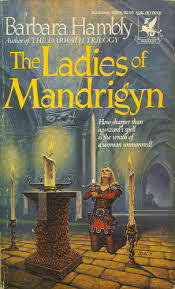
Remember Sunwolf? Oh yes, he’s our new gardener. He takes care of the orangery. Ignore all those sword calluses.
Great book. It’s got a new cover, I see:
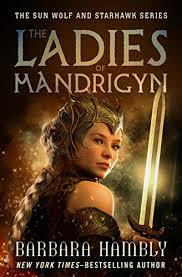
What a very typical modern cover. Perky young woman with sword. Blends right in with the crowd, I fear. Not that it’s a bad cover, sure, it’s just … another perky young woman with a sword.
The first cover didn’t suit the book, actually. I don’t recall anything remotely like that scene. No organized religion or vigils or anything, not that I can recall. A cover like that does stand out a bit more, though.
Okay! Of this trilogy, I liked the first book the best, but the second book was also very good (Witches of Winshar). The third (The Dark Hand of Magic) was the weakest imo, but still good. Hambly can be — often is — quite ruthless with her characters, isn’t she. That was on display in Dark Hand.
If you’ve read this trilogy, weigh in! I think it would make a find entry point for Barbara Hambly’s fantasy — maybe the best entry point. What do you all think?
Please Feel Free to Share:








April 7, 2020
Small good things
It’s now clear that two out of the eight Magnolia ‘Ann’ cuttings I started last spring made it through the winter. Magnolias are often precocious, flowering at a tender age, but this particular baby is a little over-precocious:

The stem of this magnolia is literally under two inches tall. I took a ruler out and measured it.
I must add, I did pinch the flower bud off after I took this flower. Enthusiasm is a fine, fine thing, but seriously, a baby this small needs to put its energy into general vegetative growth, not flowers.
Please Feel Free to Share:











